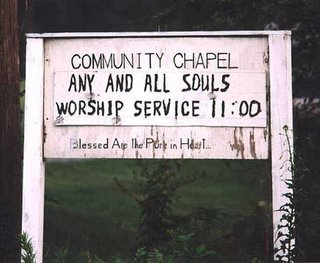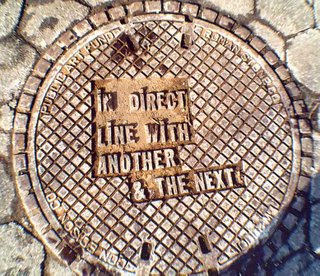
I like to start each post with a quotation, and so far I haven't tipped off my reader that I'm one of
those people, so I might as well make it clear, as, from time to great time, I might want to talk about this stuff. (Mind you, I wouldn't, very much, except that certain other people say that I can't.)
"Then if any one says to you, 'Lo, here is the Christ!' or 'There he is!' do not believe it. For false Christs and false prophets will arise and show great signs and wonders, so as to lead astray, if possible, even the elect. Lo, I have told you beforehand. So, if they say to you, 'Lo, he is in the winlderness,' do not go out; if they say, 'Lo, he is in the inner rooms,' do not believe it." -- Matthew 24: 23-26
"And they will say to you, 'Lo, there!' or 'Lo, here!' do not go, do not follow them." --Luke 17:23
My topic today is the coming of the End. You know, the End? End of Days?
Rapture Rangers roving roughshod round Satan's snares, beaming beatifically at the blessings persuant to perserverence of the solitary saints? It's big news, after all. Much money in that. Go and do likewise: scare the Jesus into people.
It's one thing for a couple of disgraced Republicans to make a fortune off of selling apocalyptical fantasies to people, but it's another thing when those fantasies cross the line into Republican Party actions. The dystopian and apocalyptic genre is rich, and the writers of the genre are usually pretty well off, too. Science fiction has had a thing about apocalypse since Neville Chute, and it has even been religiously apocalyptic sometimes (e.g.
A Canticle for Liebowitz). It's alluring and sexy to paint the world black with nuclear cinders or Satanic evil, because this genre allows a very special thing to the reader: a sense of being of solitary virtue.
Most of us stumble along, bumping our noses against lamp posts, falling into gutters, and generally being ignored by the world, for the world is made up of only other people, and each has desires. The effect of aggregating 5 billion desires is indifference. (Perhaps that ought to be The Geogre's Paradox?) So, whatever virtues we practice, whether of cleverness or piety, no one really cares very much. What's more, our virtues might not actually be very great, if they were seen objectively, but each one takes discipline and effort for us, and therefore we have a somewhat inflated view of them. That's alright. After all, I know that you're special.
The apocalyptic does this really groovy thing: it takes away the 5 billion desiring beings or it passes sentence on them. It elevates the reader. The reader identifies with the protagonist, and the protagonist is, most of all,
nearly alone. Additionally, the protagonist's virtues shine out against the dark background. Against a world ruled by the anti-Christ, Ranger Rick looks really special. Against the nuclear fallout, Randy is really quite clever in Pat Frank's
Alas Babylon. What could be better than the end of the world?
The Apocalypse, as opposed to the apocalyptical, is, in fact, a final judgment, a moment when the billions will be cast out and the saints preserved. For Christians suffering persecution, it has been a consoling thought or a worrying one. After all, it is this very idea that has generated
Universalism. It is why some rub their hands in glee and others worry that our theology is too restrictive. However, if we look for the apocalypse in the Bible, we seem to be drilling a dry hole. There isn't much. Oh, there is
Revelation, but I'll deal with that in a moment. Let's see: we have a bit in
Daniel, and we have Jesus Christ speaking in all of the synoptic Gospels of the end, but He does this strange thing, this thing that doesn't help the Tim LeHayes of the world: He says not to believe anything anyone tells you about the end. He tells you not to trouble yourself with it. He says to live each day as if the judgment were upon you, and then that's all you need to do, because
you cannot prepare. I hope not very many fundamentalists would disagree that the import of the passages quoted above is that it is impossible to prepare for the end in any way except to be always "watchful." Since Jesus says to be watchful but then immediately tells you not to believe anything anyone says, what can "watchful" mean?
I'm no one's confessor, but I would think that being "watchful" means watching yourself, and I'm no one's doctor of theology, but I would think that Jesus Christ has a higher authority than John the Revelator.
The Revelation of John is a very strange book. Show of hands: how many of you who have read it think it's literal and not poetic? Let's see.... Well, it sure seems poetic. Beasts with ten heads and seven crowns, dragons, etc. Ok, now, show of hands: how many people would define "prophet" as "person who predicts the future?" Hmmm, many hands. So, when Jezebel had 300 prophets put to death, they were seers and oracles? When Elija and Elisha go from town to town and they are always met by the community of prophets, those are all seers? The books of Isaiah, Elija, Ezekiel, etc. are like Nostrodamus? Have you actually
read these books? John the Baptist is accounted a great prophet, and Jesus says that he is Elija, but did he foretell the future?
Most prophets are the voices of the Lord. They are the divinely inspired men who tell God's truth to the secular world. They tell Herod that he is in an incestuous bed. They tell the kings that they are forsaking their duty to the Lord. They tell the people to repent. They very rarely talk about what is to come. John's Revelations were prophecy. They were poetic descriptions of the trials of the church in the secular world, and they were talking about how the Church shall withstand all of the afflictions of the evil Roman emporer Nero. They were instructions to the churches. They were absolutely true and totally poetic.
Misunderstanding
Revelation as being about today is an old, old game. It is an old, old error. In 999 AD, people freaked out, expecting the Apocalypse. They had many candidates for anti-Christ, too. Furthermore, whether Palestine has been Jewish or not, people have had no trouble at all in locating Jerusalem all over the world. You see, every generation is the worst that has ever lived. Even when people were amazingly pious, when atheism was a capital offense, when one third of the people were going into cloisters, the priests and leaders had no problem thinking their generation uniquely wicked, uniquely oppressed, uniquely deserving of the scourge of God. This tendency is absolutely unavoidable, and, in fact, it is useful for all of us to know how rotten we are and to think ourselves worse than our ancestors, and I wouldn't waste your time talking about it, dear reader, if that were all there was.
One of the things that radicalized my politics was Jerry Fallwell. In 1980, he looked into a network news camera and announced that "You can't be a good liberal and a good Christian." On the off chance that he was right, I decided to be a good socialist and a good Christian. That year was a watershed for our water park slide down into moronia. By now we have splashed. Fallwell wanted his non-organized churches to control politics, and my dear left wing responded with scattershot whines and general hand wringing. We kept saying, "Nunh-huh" as we refused to talk about morality, and they kept growing.
About four years ago, I heard a report on the BBC where Tom Delay spoke to a Christian conservative convention about Israel. He was all in favor of Israel, you see. Now, mind you, the man has made anti-semitic comments, and many of those he was speaking to think little of the Jews, but Delay was entirely in favor of Israel. It had to be supported, you see, because Israel had to get to its Biblical borders. Why? Well, because that will force Armageddon, as recorded in the predictions of John.
You think I'm making it up?
Check it out for yourself. There is even a group of ranchers in Texas trying to breed a
red heifer so that the Messianic Jews could have a new king (which the fundamentalists could, of course, see as an immediate anti-Christ). It's a neat trick: the ultra Orthodox in Israel get to crown a second David, and the fundamentalists breeding the animal get to enable them to create anti-Christ. It's a win/win situation!
The problem here is....
Well, there are too many problems here. First,
Revelation of Saint John is not a fortune cookie. Second, God's will is God's will, and not yours. You cannot make God act. You cannot force God to bring the rapture (if there is one...that comes from John). You cannot force Satan to bring the anti-Christ (if there is one...that comes from John). You cannot do anything at all to comfort, abet, coerce, forestall, or frustrate God's plan for the end. You cannot accelerate it or retard it. As Jesus said, unambiguously, do not go. Do not believe them.
Worse merely than wasting their time and money, though, these people obsessed with "prophecy" and with fulfilling it are committing a tremendous sin of pride. God judges us, and we do not judge God. Jesus said that no man knows the end, that even He did not know, that only God the Father knew. For these dime store evangelists to announce that they know the end is for them to make themselves greater than Christ. For them to try to create the conditions for the end is for them to tell God that His timing isn't convenient for them or that He needs some help. Did God need help with the Incarnation? Where was the Ralph Reed of the ancient world rallying people to get reservations so there would be an overbooked inn? The one part of the predictions of the end that Jesus made that these people rarely identify is the proliferation of false prophets. Oh, they point at Mohammed and various Yogis, maybe a terror leader here, a Cuban revolutionary there, but they don't notice the best part. By announcing that they will create the conditions for apocalypse, by arrogantly making themselves better than Christ and more important than God, they are becoming false prophets. They say, "Here he is!" Do not go.
Leave well enough alone. Live your life on guard, yes, but on guard against your own sinfulness and especially your own
hubris. Read Augustine's
Civitas Dei some time, for we belong to one city, one nation, and if our secular world is filled with pious and loving people, you will not need to agitate to bring down fire from the skies, and you might even accept the humility necessary to live in a world full of other people, the humility of not having your virtues displayed against an array of corpses.











